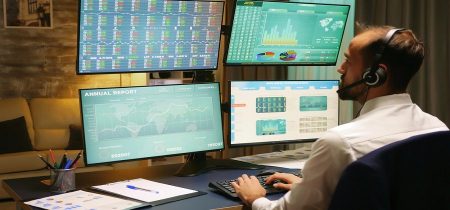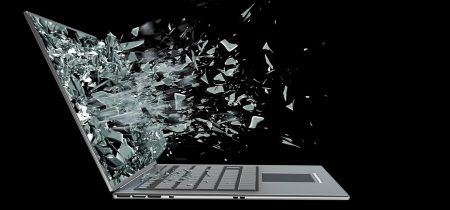Choosing the right laptop for a cyber security course can be a challenging task. Cyber security involves complex processes that require a powerful and reliable laptop to perform the necessary tasks efficiently. With the constant advancements in technology, it’s important to stay up to date with the latest hardware specifications to ensure the best performance.
In this article, we will provide you with a comprehensive guide on what to look for in a laptop when choosing one for a cyber security course. We’ll also provide recommendations for the best laptops available in the market that are suitable for cyber security courses. By the end of this article, you’ll have a clear understanding of what to consider when selecting a laptop for your cyber security course.
Minimum Laptop Requirements for Cyber Security Course
When it comes to pursuing a cyber security course, having the right laptop can make all the difference in your learning experience. Cyber security courses are often heavy on software and tools that require a powerful laptop to run smoothly. In this section, we’ll go over the minimum laptop requirements that you should consider when choosing a laptop for your cyber security course.
- Processor: A laptop with at least an Intel i5/AMD Ryzen 5 processor is recommended for learning cybersecurity course. These processors provide enough speed and power to handle the demands of most cyber security tools and software.
- RAM: Your laptop should have at least 8GB of RAM, but 16GB is recommended. This will ensure that your laptop can handle multiple programs running simultaneously without slowing down.
- Storage: You’ll need enough storage to install and run all the software and tools required for your cyber security course. A laptop that has 256GB of SSD storage is recommended.
- Graphics Card: A dedicated graphics card is not necessary for a cyber security course, but it can be helpful for running certain tools and software. An NVIDIA or AMD graphics card with at least 2GB of VRAM is recommended.
- Operating System: You’ll need a laptop with a modern operating system such as Windows 10 or MacOS. Linux is also a popular choice among cyber security professionals.
Which Laptop Is Best for Cyber Security Course?
Now that we know the minimum laptop requirements for a cyber security course, let’s take a look at some of the recommended laptops that are suitable for this field.
- Dell XPS 15: This laptop has a powerful processor, fast storage, and a dedicated graphics card, making it an ideal choice for cyber security students. It also has a 15.6-inch screen with a 4K resolution display that provides clear and vivid images.
- Lenovo ThinkPad X1 Carbon: The ThinkPad X1 Carbon is a lightweight and durable laptop that is perfect for cyber security professionals who are always on the move. It features a long battery life, a responsive keyboard, and a vibrant 14-inch display.
- HP Spectre x360: This 2-in-1 laptop is a great option for cyber security students who need both portability and versatility. The Spectre x360 has a sleek design, a vivid 13.3-inch display, and a long battery life that can last up to 12 hours.
- MacBook Pro: The MacBook Pro is a reliable and powerful laptop that is preferred by many cyber security professionals. It features a sleek design, a high-resolution display, and a fast processor that can handle complex tasks with ease.
- Asus ROG Zephyrus G14: This laptop is ideal for cyber security students who want a powerful machine that can handle heavy-duty tasks. It comes with a fast processor, a dedicated graphics card, and a 14-inch display that provides clear and vibrant images.
These are just a few of the recommended laptops for cyber security courses, but there are many other options available in the market. We recommend you to read this post best laptop for cybersecurity course.
Buying Tips
If you’re looking to purchase a laptop for use in a cyber security course, there are a few things to keep in mind in this cyber security guide. Make sure the laptop has a good processor and enough memory. Be sure to get a model with anti-virus software and security features like two-factor authentication. And finally, consider whether or not you need a touchscreen or an external keyboard/monitor.
Here are some more specific buying tips:
Consider The Processor
A good processor is essential for any laptop used in a cyber security course. Laptops with powerful processors can handle multiple tasks simultaneously, which is important for tasks like virus scanning and online research. Look for laptops with at least an Intel Core i5 or Core i7 processor.
Get Enough Memory
Another key factor when purchasing a laptop for use in a cyber security course is memory. Make sure the laptop has at least 8GB of memory, although 16GB or more is recommendable. This will allow you to open many files at once without slowing down the computer.
Get Anti-Virus Software
In addition to having a good processor and memory, you’ll also need anti-virus software on your laptop. Many laptops now come pre-installed with this type of software, but make sure to check before purchase. Laptops that don’t have anti-virus software can be expensive to upgrade later on.
Consider Whether You Need a Touchscreen
Some laptops now come with touchscreen displays, which can be useful for tasks like online research and completing online exercises. But if you don’t need a touchscreen, be sure to get a laptop without one. Laptops with external keyboards and monitors are often the best option for cyber security students.
Consider What You’re Using the Laptop For
When you’re shopping for a laptop for use in a cyber security course, make sure to think about what you’ll be using it for. Will it be used for online research, writing papers, or completing online exercises? If so, make sure the model you choose has the features necessary for those tasks.
Conclusion
Choosing the best laptop for a cyber security course can be difficult. There are many factors to consider, such as the processor, screen size, memory and storage capacity, number of USB ports, operating system (OS) and more. The best way to find the right laptop for your needs is by doing your research and reading reviews. Once you have a good idea of what you need in a laptop for your course, go ahead and start shopping.














